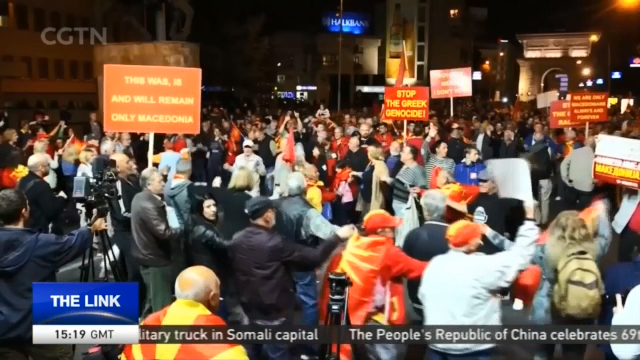
08:19, 02-Oct-2018
Macedonia Referendum: Poll on changing country's official name fails after low turnout
Updated
07:20, 05-Oct-2018
03:01

Citizens of Macedonia have voted in a referendum over the country's name. It was part of a deal reached in June between the Macedonian and Greek governments. The long-running dispute over the country's official name has not only hampered relations, but also affected Macedonia's future. Macedonia had agreed to change its name to the Republic of North Macedonia. But as referendum results emerged on Sunday evening, they showed the poll would be voided. Our correspondent Aljosa Milenkovic tells us more from Macedonia's capital Skopje.
To make the referendum valid, more than 50 percent of voters needed to turn out. And it was cold shower for those supporting the country's name change, when the first turnout figures started emerging. Numbers showed that over 91 percent of voters supported a name change, but only about 34 percent of Macedonian voters actually decided to go to the polls. Soon after the results were known, Prime Minister Zoran Zaev, vowing to continue to fight for the acceptance of the referendum results, despite the turnout. He also called on the opposition to support the country's name change, regardless of whether a majority of people boycotted the referendum.
ZORAN ZAEV PRIME MINISTER OF MACEDONIA "I expect lawmakers from the opposition party to respect the democratic decision of the majority among those who voted. There is no other way, we'll need to use the other democratic instrument, and that means early parliamentary elections soon."
Some see the result of this referendum as a major failure for the ruling party.
KRISTIJAN MICKOVSKI LEADER OF OPPOSITION VMRO-DPMNE "The government lost its legitimacy. The only thing left now for them is to accept the will of the people. This message from the people should be respected by the prime minister, the government, the parliament, all political parties. The failure of the referendum is the direct responsibility of Zoran Zaev, the government and nobody else."
And while politicians were holding press conferences, hundreds of Skopje's citizens started gathering to express their feelings about the referendum results.
ALJOSA MILENKOVIC SKOPJE "People here are in front of the Parliament of Macedonia in Skopje city center. They came here to celebrate the failure of the referendum. They are happy because by not going to the polls they've rejected the deal with Greece signed by the current Macedonian government. But considering that the referendum results are not obligatory the question now is how the government will react."
The referendum's failure is seen here as the biggest win of President Gjorge Ivanov, who publicly called for a boycott. He even used the UN General Assembly stage a few days ago to express his dissatisfaction with the name-change agreement. But the political game between supporters and opponents of the name change is far from over. Now it is up to the parliament to decide what will happen next. Proceeding with the acceptance of the Prespa Agreement or going to snap elections. Aljosa Milenkovic, CGTN, Skopje.

SITEMAP
Copyright © 2018 CGTN. Beijing ICP prepared NO.16065310-3
Copyright © 2018 CGTN. Beijing ICP prepared NO.16065310-3